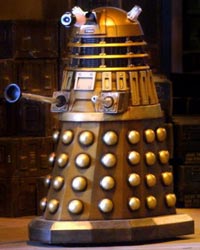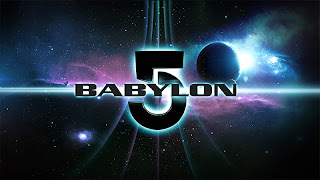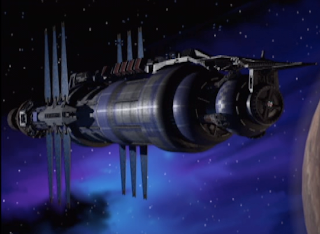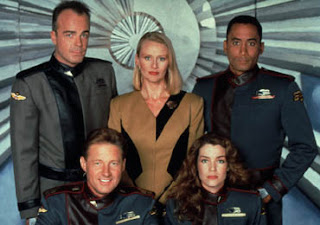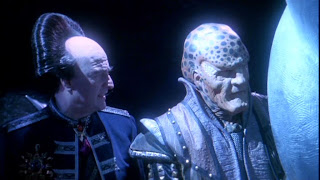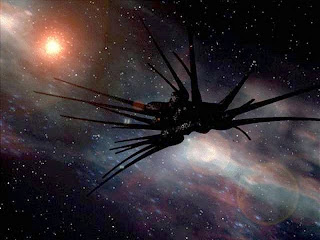Best of/Worst of 5
By
Kevin Scott Bolinger
Greetings and salutations, and welcome to my second look at Doctor Who. Today, I will be focusing on the actors who played the titular role, as well as giving a few insights on their take, and key events that would shape the Doctor's personality as the show went on. Some Doctors will have more information then others, due to the differences in acting styles, and story lines presented. I hope you enjoy. Let us jump right in by going back to the beginning, 1963. |
| The original Doctor. |
He was far from perfect, he would make mistakes, get caught off guard. A few of his companions would pay the price for that, he would mourn them in his own way. He even had to let a great massacre in France occur simply because he could not interfere. He was accused of being cold and uncaring, yet he would lament that those with him just simply did not understand. He was the first, and for many the template all others must be judged against. Hartnell could play him both fierce and threatening, yet also remorseful and caring. Sadly, many of his episodes are lost to time, so to speak. The BBC back then did not keep copies of episodes for future use. Through the years many have been found and recovered, but others, including his final performance, were destroyed. Fortunately, the audio from all his episodes was saved, and there are reconstructions, using stills from the episode, the audio, and a few computer effects.
The first Doctor was truly a fish out of water, a stranger in a strange land. All he wanted to do was explore time and space, yet trouble seemed to always find him. The crazy old man and his magic blue box. He was fond of belittling his companions on a regular basis.
Hartnell brought a certain charm to the role. Alas, his health, never the best, had caught up to him, and he was forced to leave the show. What should have been the death knell for Doctor Who, was turned into the concept that has helped it survive for nearly half a century.
 |
| The second Doctor, with his recorder. |
Patrick Troughton. When the first Doctor lost his life, the only one to do so from extreme old age, he entered his first regeneration. He emerged a new man, with a new face, and new personality. If the first Doctor was a grumpy grandfather type at times, Doctor number two was your favorite crazy Uncle whom would do silly dances for you.
Troughton’s Doctor was a very different being. He wore oversized clothes, sometimes acted clueless, and was fond of playing the recorder to help him concentrate. He was also a bit more ruthless. He was far more ready to watch his enemies die then give them a second chance to bother him or his companions. As he grew into his new form, he became more of a manipulator, and a meddler, a trait that would cause him a problem later on down the road.
The way he reacted to problems, seeming to not know what to do, or even goofing around, was all a ruse at times. The wisdom of his experiences with a long lifespan made him extremely intelligent, yet also very dangerous. He outright defiance of Time Lord laws eventually lead to a trial, the outcome of which would see him forced by his own people to relinquish his current life, made to regenerate, and on top of that, left him exiled to Earth in the nineteen seventies. His knowledge and skills needed to use the TARDIS were removed from his mind.
Troughton had fun with the role. He knew that some of the things being presented could have a bit of humor attached. Unfortunately, not many of his complete stories survive. Of the first three Doctors, the destruction of old tapes hit his era the hardest. Only six full stories survive. The rest, some fifteen adventures, exist in bits and pieces, all having reconstructions with stills done to fill in the missing parts. This is a true shame, for he was an actor who knew he was handed the keys to the kingdom, and he ran with it!
 |
| The third Doctor, the scientist, with a judo chop! |
Jon Pertwee. At the end of his trial, the second Doctor was forced to regenerate, and spend his life exiled on Earth. Pertwee’s Doctor embraced that, becoming more of a scientist. He wound up working directly for UNIT, a military organization similar to NATO. Though he tried to avoid guns , preferring to utilize his fists. He would spend his free time trying to relearn how to use the TARDIS, though ultimately, he was asked to do special favors for the Time Lords, and he did win his freedom and the knowledge once again.
He was a bit more serious then his predecessor. He did have a few quirks though. He had rebuilt and modified an old Earth car he nicknamed Bessie. Bessie would go on to be used by other incarnations in the future. His past experiences with his fellow Time Lords had left him very bitter. This Doctor was also the first incarnation to go head to head with The Master, the Moriarty to Pertwee’s Holmes, so to speak.
Pertwee’s take on the role was almost that of a stern father, yet one who was treated badly at his day job, and would sometime take his frustrations out on those closest to him. This worked, since the Time Lords had imposed such a harsh punishment on him. From day one, all the Doctor wanted to do was to explore and help those in need, and that ability was taken from him. Pertwee fully embraced this aspect.
Pertwee was the first Doctor to be broadcast in color. This was a fairly new concept back then, despite color televisions existing for close to a decade at this point. Only one of his stories was destroyed, before the BBC finally came to it’s senses and began archiving them for the future. Luckily, a black and white copy of this missing story was located many years ago. It has since been colorized. Only episodes from the first three Doctor’s suffered destruction, with Troughton getting the worst of it. Those missing have been referred to as Lost in Time.
 |
| The fourth Doctor, with that famous scarf. |
Tom Baker. When you say the name Doctor Who, most fans of the classic series immediately think of the overly large scarf, fedora hat, and long overcoat. For many, he was the epitome of the character, the one whom all others are judged against. He was also the longest surviving incarnation. While fighting giant alien spiders, the third Doctor absorbed a huge amount of radiation. He managed to return to UNIT headquarters on Earth, where he collapsed and regenerated. When he came to, thins just were not quite right.
The Doctor awoke from his regeneration cycle a bit on the manic side. Ordered to bed rest, he snuck out, and attempted to make his way to the TARDIS to leave. After a few hours, he stabilized. This new Doctor was unlike the others, yet still retained small amounts of their personalities. He was a bit of a bohemian at times, could be laid back, yet would get excited and happy when trouble appeared. Baker embraced the role, he chewed the scenery. This Doctor was, for lack of a better word, fun.
Tom Baker was out of work when he took the role. He practically begged for it, and he did not disappoint in the least. He gave the role a new energy, a playful edge, and most importantly, Jelly babies. Though he was now free to roam the universe as he wished, he too was called upon by the Time Lords. On one occasion, the practically ordered him to commit genocide, by traveling to the planet Skaro, before the Daleks were created, and his mission was to stop their creation at any cost. He failed, but did manage to delay their rise to power.
For many fans, he is the best Doctor. I have yet to see all of his stories, but have watched a great deal of them. I tend to bounce between incarnations, getting a feel for each actors take. Tom is high on my list a great Doctors, then again, so is Matt Smith, and you New Who fans, Smith is great as the Doctor, he captures the whimsy of the Doctor’s of old. But more on him later. Tom had some of the best stories. His was truly the Golden age of the Doctor. No actor would hold the role as long as he. He is the quintessential Doctor for many, yet I feel no one actor can truly be the best with a character as diverse as Doctor Who. I will admit though, Tom does come close.
This Doctor, however, was not all fun and games. He could be aloof at time, keeping to himself. He was also fond of brooding. He was not afraid of taking a life, or letting a life be taken in the name of the larger picture. He was perhaps one of the most alien of incarnations. Even his own people considered him odd. He was even manipulated by outside forces to claim the Presidency of the Time Lords, in a plot to bring about their destruction. When the plot failed, the Time Lords wished for him to stay and rule, but he did what he always would do, run!
Baker embraced every character quirk the writers could throw at him. He would show great anger when it was called for. He could also make it seem as though the Doctor was humorously keeping things from those around him, not letting them in on the joke, so to speak. It was a brilliant take on a character who was, let’s face it, an alien. Yet, even his run on the show would come to an end, and the next actor would bring a complete change to the character.
 |
| The fifth Doctor, celery and all. |
Peter Davison. When Davison was announced as being Baker’s replacement, there was an uproar in the fandom. They felt he was too young to portray such an iconic role. A similar incident occurred recently when Matt Smith was announced to be replacing David Tennant, Smith being a mere twenty-eight. Davison’s take , however, was embraced, and has even been know to be many fans favorite.
When he first regenerated, his memory was gone, and he was very weak. He was making no sense, and scared his companions. Ultimately, he was able to pull himself together in time to yet again foil a dastardly plan of the Master’s.
This Doctor was decidedly more human then the rest, and the complete opposite from Baker’s take. He could be cowardly, abhorred violence of all kinds, preferring to talk his way out. In a crunch, he could become panicky and indecisive. Yet he could still match wits with the worst of his enemies. He even refused to use the Doctor’s signature piece of technology, the sonic screwdriver, though this was more because the producers did not want it to become the fallback item to get the Doctor out of trouble. The Tenth Doctor would later go on to rib him about this, when the two met during an accidental crossing of their respective TARDIS’.
He had a penchant for playing cricket, and was known to wear a celery stalk upon his left lapel. He could also figure out the ingredients of any drink simply by the smell. He was also less likely to take charge of a situation, preferring to follow the lead of others. This was a huge deviation from his predecessors, who would all take the reigns in a bad situation.
Davison brought a compassion to the Doctor some feel he was always lacking. He could play the Doctor as soft and gentle, yet could also show how, despite all his knowledge and technology, there were still things that frightened him greatly. This vulnerability was a novel concept for a character that always seemed to be in control in the past. His take also ranks as one of the best. However, he took advise from Jon Pertwee, and stuck to it. Pertwee told him to play the role no longer then three years, and that is exactly what he did. When his time was up, a new regeneration took place, and the show, for some, began a downward trend.
 |
| The sixth Doctor, refugee from Munchkin Land? |
Colin Baker. Poor Colin Baker, he was doomed from the start. He was not allowed to give his own take on the character, but forced to play him as the studio wanted. This meant that he has gotten a reputation for being the worst Doctor to ever grace the screen. I personally do not think this way. He simply tried to make the best of a bad situation.
It was during Colin’s run that the show began to fail, mostly due to a budget that was slashed to nearly nothing. The BBC really had no love for the show anymore, and the end was nearing for this much loved character, though history would see that, like the Doctor himself, the show could regenerate.
When the fifth Doctor regenerated, it was immediately known that this new Doctor was a bit arrogant. As the seasons progressed, this would prove to be an understatement. He was prone to some rather violent outburst, especially in the first few hours of his new form. He even would go on to attack and nearly choke to death his companion Peri. He was diametrically the opposite of the fifth Doctor. He could be nasty, cruel, and stubborn. His behavior has even been labeled as downright childish.
His outfit was almost as gaudy as his personality. Sporting a coat that looked as if someone in OZ had gotten drunk one day and had patched it all together from the munchkins! His hair was huge, curly and blond. He also had a dislike for exercise, and carrot juice, both of which another of his companions had forced on him.
This incarnation, however, would become the scapegoat for a Time Lord cover-up. His accuser, a Time Lord known as The Valeyard. The Valeyard was ruthless. During the doctors trial, which lasted an entire season, the Valeyard would present evidence from a Time Lord recording device known as the Matrix. It was supposed to be infallible, and no-one could tamper with it. Unfortunately , the Valeyard found a way and had painted the Doctor in a very bad light. As the trial progressed, the Doctor worked out what was going on. He was being put on trial so that the Time Lords could erase history. They needed to wash their hands of bloodshed they had caused, and decided the Doctor should take the fall. It did not work though.
The Valeyard, it would turn out, was a possible incarnation of the Doctor himself, one from a time between his twelfth and thirteenth lives. Somehow, all the evil within the Doctor was driven out to become the Valeyard. Ironically, all this information was presented to the tribunal through the Doctor’s own worst enemy, the Master. The Master’s hope was, that the Doctor and Valeyard would fight it out within the Matrix and destroy each other. In the end, the Doctor won.
Colin Baker tried, he really did, and there are a few episodes where a likeable charm was shown in the Doctor. The studio, however put the show on hiatus and fired Baker. They then, when the show returned a year later, had the audacity to ask him to return for the regeneration scene at the beginning of the next season. He declined, having been burned by the BBC, and so the next actor was simply shot in the rainbow coat and blond wig, with special effects blurring the face.
I feel bad for Colin Baker, he was really handed the short stick. He does not deserve the reputation he has as being the worst. His hands were tied, and that is the real tragedy of his run.
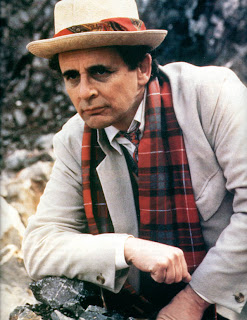 |
| The seventh Doctor, looking sullen. |
Sylvester McCoy. Sylvester McCoy would only play the Doctor for two seasons, and briefly in one television movie. His Doctor would be the last to be seen until 1996. After the hiatus, the BBC decided to give the show one more shot. They still gave it a crap budget, but gave a little more creativity back to the actor. At first, this worked, but then the writers decided to take the Doctor to a darker path, that of a great manipulator, using those around him, friend and foe alike, as if they were mere chess pieces to do with as he pleased.
The sixth Doctor , flying in his TARDIS, came under attack from another rouge Time Lord he had dealt with in the past, the Rani. During the fighting, he had hit his hard enough to trigger a regeneration. The man that emerged had no idea who he was or what he was doing. He eventually regained his senses, and began a more cheerful and good natured fellow. This was not to last, as he matured, he became someone prone to alienate himself from those closest to him, causing them to leave his side, one by one.
He would dress a bit more conservatively then his predecessor, fond of white or light clothing, at first, and always wearing a panama hat. He could be seen carrying an umbrella that had a question mark for a handle. He was also, as far as this writing, the last Doctor, to use old Bessie.
This incarnation, at one point, was even accused of being Merlin himself. This turned out to be true, from a certain point of view. As they say, technology to a primitive would seem no different then magic.
As he grew older, he was left on his own, and would be found to peacefully roam the universe. His end came when he was asked to retrieve the remains of the Master, recently executed on the Dalek home world of Skaro. Upon his return to Gallifrey, the Master’s essence escaped, and corrupted the TARDIS, causing it to crash land in 1999 San Francisco on New Years Eve. Unfortunately it landed in an alley where a gunfight had broken out, and as he emerged, he was shot twice. The doctors in the hospital thought he was human, not realizing he had two heart. The gave him a heavy dose of anesthesia, and did an exploratory to determine the irregular heartbeat, which caused him to expire. Due to the anesthesia, his regeneration was delayed to the point where he was already sitting in the morgue.
McCoy brought back the crazy old uncle appeal the Doctor had in old days. He had a quirky smile, and would play the Doctor as dumb, to make his enemies underestimate him. Alas, he too was subject to the whims of writers who really did not care for the character, and they forced McCoy to go darker, to treat those around him on screen as if they were mere plaything. I think this is what eventually led to the series cancellation in 1989. Officially, it was put back on hiatus, and with the exception of the 1996 movie, it would not grace the screen for another sixteen years.
 |
| The eighth Doctor, destroyer of worlds. |
Paul McGann. A plan was made to attempt to resurrect the Doctor, get him back into television sets across the world. It was a bold idea, but would not go the way they planned. A television movie, picking up with the seventh Doctor on his return from Skaro. As stated above, due to gunshot wounds, and human doctors no realizing he was an alien, he died, and regenerated in the morgue. The new man that would emerge would dress more elegantly. He also was far more romantic. In the grand scheme of the character, he would become the most important incarnation.
The T.V. movie, simply titled Doctor Who, would see the Doctor pitted against a new form of the Master. The Masters essence would possess a human, and his ultimate goal was to steal not only the TARDIS, but the rest of the Doctor’s regenerations. To this end, he opened the Heart of the TARDIS, the time vortex itself. If left open, the Earth, and then eventually, the entire universe, would be sucked inside and destroyed. The Doctor outsmarted him, and the day was saved. He would not , however, get the girl and travel on as before. He left Earth alone.
I will talk about McGann’s performance before getting into why this Doctor was so important to those that would follow. McGann did a fantastic job, he had a childish glee about him, and a very romantic edge that had been sorely lacking from the first seven Doctors. He would take delight in simple things, and this makes him a little endearing. I think, if a regular series had developed out of this, he would have been a pleasure to watch. As it was, the movie did not have the desired affect, and there would be no new Doctor Who till 2005.
Now, why was this Doctor so much more important then the rest? This Doctor was the one who would change everything. During his tenure, The Last Great Time War would break out between the Time Lords and the Daleks. Thousands of innocent worlds and even galaxies would be destroyed. Millions would die every second, only to be resurrected anew to continue the fighting. As the war reached it’s penultimate climax, the Time Lords had become as evil and ruthless as the Daleks. The Doctor was left with no choice. He used a weapon known only as The Moment, destroying not only the Daleks and their home world of Skaro, but also his own home, Gallifrey, and his own race. His last act before succumbing to regeneration, or death, was to use his TARDIS to time-lock the entire war, so that no-one, not Time Lord or Dalek, could escape. He was left alone in the universe, the last of his kind. From this point on, he would acquire a few names. One was The Destroyer of Worlds, another, The Oncoming Storm.
The Doctor that would emerge after the horrors of the Time War would be a bitter and scarred individual. He would carry the guilt of having caused his own peoples extinction. The Eighth Doctor would prove to be the deadliest. Though what he did was necessary, for if he did not, time itself would have been brought to an end. Though much of what I wrote can be seen as speculation, there was enough evidence given in the newer series to come to these conclusions. The Doctor would admit his hand in ending the war, he would admit that his people had been corrupted. The pieces of the puzzle are there, and what I presented is the most logical sequence of events that had played out. One day, I hope the full story of the Time War emerges, I think it would be truly fascinating.
 |
| The ninth Doctor, a man in mourning. |
Christopher Eccleston. In 2004, producer and writer Russell T. Davies , know for the show Queer as Folk, had convinced the BBC that the time was right to delve into Doctor Who again. So, in 2005, after an eternity of waiting by old school Who fans, a new Doctor once again graced our screen. This incarnation would be vastly different. Fond of saying the word fantastic to describe a situation, good or bad, the guilt he carried would show through again and again. He was known to dress in black, dark shirts, pants, and a black leather jacket, a subtle nod to the mourning he was doing.
We meet him first though the eyes of Rose Tyler, a nobody who latterly ran into him in the basement of the department store which she worked. His first word to her “RUN!” As things progressed, he tried to keep his distance, the last thing he needed was a companion, someone else who’s life could end under his watch. He eventually relented, and with her help, he would get past the worst of his guilt, but his anger still would remain. When Rose caused a paradox by saving her fathers life, he referred to her as another stupid ape.
The true bitterness he carried would manifest itself fully, when he and Rose wound up in a bunker in 2012 that had been turned into a museum of alien artifacts, including the head of a Cyberman, by a rich collector. The TARDIS had drawn them there because of a distress signal. When the Doctor is captured, he learns that the collector has a live specimen, and this specimen had sent the call. Locked in a dark room with the creature, he is horrified to find out it is the last surviving Dalek. Damaged and without orders, it was powerless and helpless. The Doctor’s first instinct was to destroy it, but he is prevented. He goes into a mad foaming rage, because no-one knows what the creature is capable of.
When the Dalek escapes and murders nearly everyone in the base, the Doctor is even more determined to destroy it. However, the Dalek had repaired itself using a sample of Rose’s human DNA, which had the effect of changing the Dalek. In the end, all it wanted was the sunshine on its face, one last time. It opened its casing, felt the warmth, then decide to kill itself. The Doctor learned a great lesson that day.
He was changed from that point, he realized he was fallible. He had admitted to the Dalek that he had destroyed both their worlds and peoples. He began to let go of the survivors guilt and anger. By the end of his life, he would again face a Dalek invasion. He was given the choice of being able to destroy the fleet at the cost of the Earth, but he relented. He was resigned to death, but was spared when Rose looked into the Heart of the TARDIS and absorbed the time vortex. She destroyed the fleet with a thought. In an act that would cost him his life but spare hers, he took the vortex into himself and returned it to the TARDIS.
Eccleston was at first excited to play the role. He brought a new energy and excitement to the role. He could be charming with his big goofy smile. He would show a wit and manicness that would endear the character to many yet again after a long delay. As the filming progressed, however, he felt he could not give the character exactly what the writers and producers wanted, so, he left. He would have the second shortest run as the Doctor, but he ensured that the series would live on.
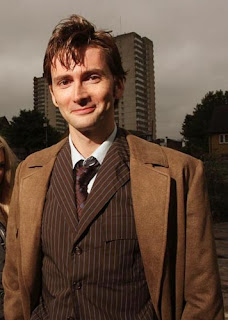 |
| the tenth Doctor, not to be crossed! |
David Tennant. After the Doctor sacrificed himself to save Rose, he picked up his conversation with her right where he left off, though stopping to comment on how new teeth felt weird. Almost immediately , something was wrong. His regeneration was not smooth, the effects of the Time Vortex were causing him to have seizures. He begins acting crazy and flies the TARDIS so erratically, it ends up crashing on Earth, just outside of Rose’s apartment. Her mom and boyfriend Micky rush to the box as the Doctor stumbles out. He sees them, puts his arms on both their shoulders, tells them Merry Christmas, and passes out. Eventually, he gets some good old tea, and it sets him right, just in time to stop an invasion by the Sycorax.
This version had a bit more humor, until you crossed him. He would only give you one chance at redemption. After that, all bets were off. He could be vindictive, and at times, cause a fate worse then death, as he did with the Family Blood. They came from a race that lived a very short lifespan, measured in days. They wanted to use the Doctor’s life-force to grant them immortality. He hid himself using a bit of Time Lord technology to turn himself human and erase his memories, storing them for future restoration in a simple pocket watch. The Family tracked him down, and killed many innocents to get to him. When his memory was restored, he destroyed their ship, but gave the four members of the family their wish for immortality, but in twisted, vengeful ways.
He went through numerous companions, loosing Rose in a parallel universe, his second, Martha Jones, left on her own, because she loved him, but knew he would never love her. After he had to wipe the memories of his final companion, Donna Noble, he decided to travel alone. He was eventually told that his time was ending, something was returning, and that he would knock four times. These were all clues to how his life would end, so he did what he always would do, he ran, trying to avoid his fate. His arrogance blinded him, he declared himself not the survivor of the Time War, but the winner, the Time Lord victorious. Unfortunately, as soon as he did, he found out how wrong he truly was.
At the end of his life, his old enemy returned from the dead, The Master. His body was unstable, and though the Doctor tried to offer him help, the Master refused, using alien technology to turn the entire population of the Earth into himself. Unknown to either the Doctor or the Master, Rassilon, the resurrected leader of the Time Lords during the war, had managed to create a loophole to allow Gallifrey to escape it’s fate. Using the point in time of the Masters childhood, when he looked into the Untempered Schism and went insane, a simple rhythm was placed in the Masters head, a constant drumbeat that was the driving force of his madness. The ultimate goal of all this, to bring about the Final Sanction, the end of time itself, to allow the Time Lord to evolve into beings of pure energy. Working together the Master and the Doctor stopped Rassilon, and flung Gallifrey back into the hell of the time war, the Master sacrificing himself to accomplish this.
Overjoyed that he had survived, he was snapped out of his reverie by a small tapping sound, four taps. Donna’s Grandfather Wilf, who had been helping the Doctor, was locked in a radiation chamber. In order to save him, the Doctor would be forced to absorb the radiation himself. He did so, despite Wilf’s pleas not to. He took Wilf home, and decided, in the short time he had left, to say goodbye to his old friends, in his own way. Defiant to the end, he tried to hold off his regeneration to the point where when it did happen, it was so violent, it destroyed the interior of the TARDIS control room, causing it to begin to crash back to Earth, pouring out smoke, the new Doctor inside, giddy with glee over the danger.
David Tennant is arguably the most popular amongst the New Who fans. However, these very same fans, for the most part, have seen little to none of the classic series. He did bring a new twist on the character, making him a lot more hip, always spouting pop culture references. As time went on, he would become more melancholy, as his companions were taken from him one by one. David could convey the pain behind the Doctor’s old , weary eyes very well. When he was serious, you knew someone was going to pay for crossing the Doctor.
There was one thing, however, about this version of the Doctor that just never sat right with me. He had an air about him of being vastly superior to everyone in the universe. This arrogance would bite him again and again, causing him to loose many close to him. He though himself perfect, infallible. In the end, he knew he wasn’t, but was still afraid to let go, admitting that regeneration felt like death, everything he was would be lost, and a new man would go off and continue the journey. All the other Doctors seemed to embrace regeneration, as if it was just as normal as breathing. The Tenth mourned it. I think what he was really mourning was that he had been wrong, that he was imperfect. For many, in reality, this can be a very hard lesson to learn.
 |
| The eleventh Doctor, bow ties are cool. |
While coming to grips with the violent regeneration that had created him, the Doctor was trying to get the TARDIS under control, all while hanging out the door. Narrowly avoiding crashing into Big Ben, he ends up crashing the TARDIS on its side, in the back yard of little Amelia Pond. Still in his torn and tattered clothes from his regeneration, he tries to help Amelia with a crack in her wall, that is really a crack in the skin of the universe. As he is trying to figure it out, the warning bell on the TARDIS goes off, and he needs to do a quick jump in time to stabilize it. What should have been five minutes, turns into twelve years for Amelia.
He returns, and is locked out of the TARDIS as it repairs itself. As events play out, an alien race is determined to burn the Earth to destroy an escaped prisoner. After catching the escapee for them, and saving the Earth, he calls back the aliens. He then admonishes them for trying to destroy Earth, showing them that others have tried. Yet they were all stopped, by the previous incarnations of the Doctor. To make his point to the aliens, he calmly walks forward after they see the evidence and says “Hello, I’m the Doctor. Basically…run.” The aliens get the hint, and quickly leave, and all this was just in the first few hours of his current life.
This Doctor harkens back to the old days, the definitive fish out of water. He is truly alien, and it shows. He still retains a bit of arrogance, in that he is constantly telling others to shut up when he is talking. However, he has learned a great deal of humility, and will admit when he is wrong. He may look young, but there is a boundless wisdom brought on by old age behind his eyes. He can be a fast talker, trying to use deception to his advantage, but in one instance, even he told a lie too big for his psychic paper. He still possesses that childlike glee when there is danger, but he tempers it more with a bit of caution.
The Eleventh Doctor is very awkward in social situations. He can be completely clueless at times, which his companions seem to catch and poke fun at. He is far from normal, and this is a good thing. Yet, he can at the same time convey a great deal of authority, while using a very quiet speaking tone. He can be prone to great fits of anger when the simplest of things frustrates him. Yet it is the quiet anger that one needs to be wary of. As one foe learned, he was able to take down everything she had set in motion, simply because she failed to even remember one of her victims names. Though, he also flew off the handle a bit at the beginning of a football match he was playing, misunderstanding the phrase “We are gonna kill them!” thinking he meant there would be violence, yet halfway through his admonishing speech, he got it, and was apologetic. He also showed he had absolutely no idea how to handle simple kissing, and could offer no advice to a companion who would experience his first.
Matt Smith has caused the rift between the two fandom factions. The Classic fans love his take on the Doctor, saying how much he reminds them of the old Tom Baker days. The New Who fans, well, he isn’t David Tennant, so they hate him, yet have no evidence to put behind that statement. The accuse him of trying to be too much like Tennant, which he is far from guilty of, and yet others complain because they feel he is not enough like Tennant, and really, that is the point of the Doctor, every regeneration is different from the last.
Matt is just fantastic as the Doctor. His outfit makes him stand out as being not quite the norm. He can play both the quiet emotional scenes just as well as the loud, boasting, “I am the Doctor” scenes, with equal professionalism. He is having fun with the role, and I feel that is what is important. Time will tell how he will be received, having only one full season under his belt. The looks he gives when the Doctor is confused are just brilliant. His eyes can convey so much, which is a sign of a good actor. Is he the perfect Doctor? Some say yes, some say no. I will say, let us see what happens. As I stated above, I have no clear favorite, since each actor brought their own personal touch to the role. So far, Matt has done a good job trying to fill the much loved shoes of David Tennant.
We shall end here, as this is a very long installment, and those with ADD have probably stopped reading at Tom Baker. Next we, I will conclude my look at Doctor Who, and try to leave it to you who is the best and worst Doctor. I will also take a more in depth look at a few of the Doctor's best know villains. I hope you will join me then. As always, remember, we are simply the universe, trying to find it's voice, we are one.



